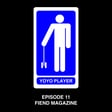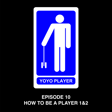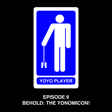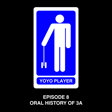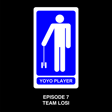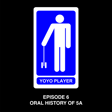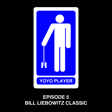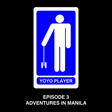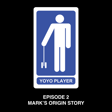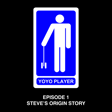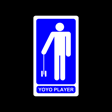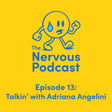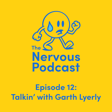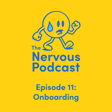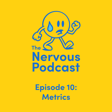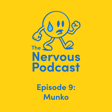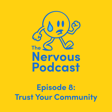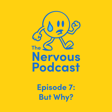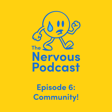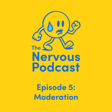Become a Creator today!Start creating today - Share your story with the world!
Start for free
00:00:00
00:00:01

Triple D
Mark & Steve discuss the Triple D Classic, a one-off yoyo contest they ran in Los Angeles in the early 2000s. It was in a punk rock dive bar, had three bands playing between divisions, no scoring system whatsoever, and all the parents started drinking at noon.
It might have been the best contest ever.
Recommended
Transcript
Introduction and New Yo-Yo Styles
00:00:00
Speaker
I'm Steve Brown. And I'm Mark McBride. And this is a podcast about that time. We made up two whole new styles of yo-yo play. And at the time, nobody cared. And now a few people care, maybe.
00:00:36
Speaker
So, you know, it's funny from that from that last episode, one of the things that when I when I rewatched the Philippines DVD with Jenny, my wife, one of the things that she pointed out was, isn't that weird how your contest still look exactly the same as they did 20 years ago? It's true.
00:00:57
Speaker
Yeah. And it really, and as soon as she said it, I was like, Oh shit, I cannot unsee this. Like this is rough. But then it made me think of the triple D, which is the first yo-yo contest that did not look anything like that. And man, that was very nearly a train wreck. That was a good time. So that's something to talk about. Yeah, that is for sure. Something to talk about. So the triple D,
00:01:20
Speaker
I can't even pinpoint the exact year. And again, this is also, this is pre like ubiquitous internet, Instagram, social media of everything. So it's hard to even look back, but it was either 2002 or 2003. That's true. So it was 2002, 2003.
Yo-Yo Industry Challenges
00:01:36
Speaker
It was after
00:01:38
Speaker
After Yoyoing had had its boom, and then the boom had died and cycled out, it was long enough that we had established the DXL crew in Southern California, and we had a network of friends and stuff getting together. But yet, it was a couple years before
00:02:01
Speaker
working at what I'd worked at Kung Fu Records, which was when we did Viking tour and Philippines tour. So you would have been at Duncan in Ohio by this point.
00:02:15
Speaker
Right. So I was working at Dunkin. I was living in Ohio and working in the office. And to give you some larger context for where the industry was, again, it was post-Yoyo boom, but it was an ugly time post-Yoyo boom. Because what was happening now is that from a mass market standpoint, so all the companies that were mass market distributed, right? So it was like Dunkin, Yomega, Playmax, blah, blah, blah. So I think Playmax might even have gone, was close to going under or had gone under at this point.
00:02:46
Speaker
But all these companies, like all of the big mass market retailers had a glut of inventory that they were trying to mark down and blow out and they couldn't get rid of. So they were like fill, I mean, every shelf in America had discounted yo-yos on it. So all of the large yo-yo companies were screwed.
00:03:07
Speaker
Yeah. So the trick was like, how do you constantly promote despite the fact that you have no money for R&D, you have no promotional budget, your sales are flatlined, but you still need to move units. You still need cashflow. So like the big challenge that I was dealing with at Duncan is like, I was constantly trying to figure out how to promote yo-yoing, but do it in a way that wasn't going to cost us any money.
The Rise of Local Yo-Yo Clubs
00:03:32
Speaker
But by that point, we had really started to establish the clubs and the local gangs were really supporting and propping everything up. And so that really became where this came from was the Southern California, the DXL crew had really come into its own, which we should just explain what that is.
00:03:59
Speaker
Yeah, so DXL stands for Double XL. And it was it was almost a joke born out of the fact that when Brian, Brian Kabildo, who started DXL. Glass eye. Glass eye. So he was putting together like a Southern California yo-yo club and he was he was literally asking people like for their sizes for T-shirts so he could order them and everybody was saying double XL, double XL, double XL.
00:04:27
Speaker
Because it was the late 90s, early 2000s, and everybody wore their shit enormously baggy. And so out of that, he literally renamed the club, which I think at the time was called something dumb like SoCal YoYo Club or something. He renamed it DXL Crew. Because it started as a shop club for this totally shady,
00:04:52
Speaker
Like this totally shady video store that was just following, that was just following the trends at the time. Oh my God. I totally fucking forgot about that. It was like a VHS video rental shop.
00:05:09
Speaker
And the couple that owned it, totally shady, following trends. So at this point, again, this was where Yo-Yo-Ween had become big. So everyone stocked Yo-Yo's and stocked stocking Yo-Yo's. What were their names? I remember that. They changed them to avoid creditors at some point. Yes. I remember, no. I mean, these folks were amazing. Like, they were the sketchiest, sketchiest motherfuckers. Nice, nice.
00:05:40
Speaker
Yeah, I mean, that's they were really sweet, but they were also just like an absolute nightmare. I mean, like when I say nightmare, I mean, like breaking down on the way to yo-yo contests, like missing events because like somebody got arrested. Like, I mean, that level, like the kind of shit you would expect more from a guy who grew up in Jacksonville, Florida.
00:06:02
Speaker
which is really hilarious because glass eye who is the like kind of the backbone of that is like one of the nicest straight shoot nest like
00:06:14
Speaker
Like trustworthy guys. I know. Class. I class. I play his guitar in his fucking church choir. Like glass. I is so involved in this church. It's comical that he wasn't involved. Like he was involved. So as they were like, I think they might've genuinely like their, their shop had closed. They were like,
00:06:35
Speaker
If you told me they were on the lam at that point, I would have believed it. But Glass Eye had this gang of kids that were just great, awesome, intuitive, super innovative. When you list off the names, this really was like the Dogtown Z-Boys of yo-yoing as far as a lot
Influential Yo-Yo Players and Innovation
00:06:59
Speaker
of innovation. We're talking about, it was Felix Avelana, Jason Lee,
00:07:04
Speaker
James. James Lack. Jason Gallagher himself was just a personality, although like, you know, trick wise and of course Glass Eye himself, you know, like so much came out of that. Ant-Man and his brother, Anthony Maw. Yeah. Spencer would have been, Spencer was definitely part of that. Spencer was Northern Cow. But he came down, like he had a, like he was North Cow, but somehow was very like,
00:07:32
Speaker
He had a time in Southern Cal, but he was very involved in that. So yeah, he was actually kind of on the Spindox edge though, because they were the compliment. They were the NorCal gang. Yeah. Spindox was like Spencer and Gary Longoria, Jeff Longoria, Paul Escolar. Yeah. Nathan Chrissy.
00:07:53
Speaker
Nathan Chrissy. Yeah. So like between man between between Spindox and DXL, that's literally like 80% of all fucking yo-yo development for like a solid five year period. That's absolutely the case. So we so we were doing by this point, like I said, all the events were on the shoulders of like the clubs and this, you know, like obviously we would always reach out to
00:08:19
Speaker
the two yo-yo companies left, three yo-yo companies left, but still, as you point out, there just wasn't the promotions that there was a few years earlier. Right. There was no budget. There was just no budget. If you could get a few hundred bucks out of them, that was kind of amazing, but mostly- You got prizes out on your happy to have it.
00:08:41
Speaker
You were happy. Yeah, you were happy to just get yo-yos to give away his prizes. And so I was working at Dunkin and I was constantly like I was engaged in like a full blown culture war at that point. And this is something that like I don't know. I don't know how to talk about this larger. Maybe maybe this is a full separate episode. But like I was actively like like I had come up with like the whole CD-ROM idea for Dunkin and
00:09:08
Speaker
I'd gotten no idea records on board and all of our promotional videos, it was all punk rock bands. I had put together the Dunkin' Crew and filled it with as many punk rock kids as possible. I was actively doing everything I could to bring as much punk rock culture into yo-yoing as I could.
00:09:30
Speaker
in order to make Yoyo and Cooler. And don't forget, by this point, this was post-Warp Tour. So we had spent a summer on the Warp Tour making, you know, and took friends off of that. You know, like Timmy Chunks became a great friend. So we had all these friends in punk rock bands, both from growing up and from people that we had met on Warp Tour. Let's also throw in. I mean, we got to say the name of the Yoyo Princess, you know,
00:10:00
Speaker
It was a linchpin in this whole thing. It was Jen Niles. Jen Niles. Jen Niles was like, she was a huge part of the golden apple yo-yo community. Because she was gold. She worked at Golden Apple. She worked at Golden Apple. And the summer of 99, when things were kind of booming,
00:10:22
Speaker
Bill had a deal with the LA County Library system to do demos at LA County Library. So she was doing local demos, like she was just kind of the regional demo chair. So she was doing these demonstrations. Bill can't overstate the amount of support that he held up the Southern California yo-yo scene that became so influential. And again, you could argue right hand man on that, like a lot of that stuff.
00:10:51
Speaker
You had, so you had DXL crew, which was meeting like a Huntington beach area. I don't know where they were meeting officially. Like I was, I was, I was part of DXL crew when they were in Hollywood, but, and I think that they would, because there was the peer group, but I don't know if I think that was, you know, Yoshi's thing, which was separate.
00:11:10
Speaker
I think it was large, so I think DXL was largely Huntington Beach area, and then Golden Apple Comics was right there on Melrose. So you had two, and Golden Apple Comics got a handful of the older kids, but it was mostly the younger crowd. But you had two really strong, solid groups, two really strong clubs in that immediate area.
00:11:34
Speaker
One a little older, one that skewed a little younger, both of them run by dedicated people with a lot of connections in the area. Well, what would happen is that Bill had the real estate and he could put together an event, so he would get pros in, he would get events, he would make contests, and then the DXL crew would come up to us. Right.
00:11:53
Speaker
But the DXL crew was like the older players who were like really setting the tone for like trick creation. Like that was like a hotbed of creativity. So, so you had, there was a huge base there. Like there was a huge base to build on. And when I was working for Duncan, like it was not uncommon for me to come out to Los Angeles and spend a few days like doing demos or stuff, do like product releases. Whatever video we were working on at the time. Yeah.
00:12:20
Speaker
Yeah, anytime we were shooting video for anything, I would go to LA and then it would just be like a week or two week
Punk Rock Yo-Yo Contest Planning
00:12:27
Speaker
party. That's where we shot almost all the footage for the CD-ROMs. Yeah, all of them came after I left this. The missing D in this was destroy all monthly.
00:12:39
Speaker
Now, Destroy All was, to this day, one of my most admired, like brilliant concepts for a magazine, which is a music magazine, except they would run reviews
00:12:56
Speaker
and band interviews of bands before they came to town. Right. So it was essentially like a music preview magazine for what was going to be happening the next month in LA. So you could pick up this magazine and you could get album reviews for bands that were on tour that were heading to LA.
00:13:15
Speaker
you could get a ton of band interviews for bands that were on tour and heading to LA. And you know, it would come out like end of the month, beginning of the month. And then that was that was kind of your guide to all the shows that were going to be happening in Greater Los Angeles that month.
00:13:31
Speaker
Now, this was also, you know, just for context, this seems like strange now, but this is functionally before the Internet. This is before websites were a thing. So you would write and then pass this. They would print this magazine out and pass it around. It was connected. They had, I believe, Rafe and Charlie's project.
00:13:50
Speaker
Yeah, Rafe and Charlie started Rafe from Blue Collar Special. That was his band. I think that was his band. Yeah. And so they had a record shop and we're doing this out of the back of the record shop. Jen was, I don't know exactly what Jen's role, she was heavily involved. I don't know if she was, I don't think she was editor, but she
00:14:09
Speaker
was, you know, functionally random editing. I think she was doing like ad sales and stuff. I mean, she was definitely like, yeah, she was like, she was part of the masthead, right? Like she was part of the team that was making the magazine happen every month. Yeah. And I was writing for it. I was too. I did. Oh my gosh, I should find these. There was a monthly cartoon
00:14:33
Speaker
of a yo-yo trick in that magazine. I remember that. That was like super spy Jim, because at this point, again, we were, we come off of, we come off of a warp tour. So we had, and Jen was the force of nature. That is Jen Niles. Yo-yo's were around that scene when she was recruiting people and to, um, get you to the magazine. Excuse me. She said, Hey, you want to, you want to do so? I was like, yeah, sure. I'll,
00:15:03
Speaker
I'll do a yo-yo trick each month, but I did it as a cartoon and my challenge was to do it as a single panel cubist cartoon. So the idea is that you would see the entire trick in one fluid motion drawing of this, you know, like mock spy doing something, like somehow trying to break into a safe or diffuse a bomb or something like that with a yo-yo trick.
00:15:32
Speaker
all in one panel. It was surreal. Like I can't believe somebody not on drugs was making that cartoon each month. I mean, yeah, it was some pretty pretentious dumbassery, but we loved it. So pretentious.
00:15:48
Speaker
So I was writing record reviews badly and I was occasionally interviewing bands less badly, but still not great. So I was involved in the magazine. You were involved in the magazine. I was working at Dunkin. And again, I was constantly looking for ways to involve punk rock into yo-yoing more. And I don't even remember like when the idea came about. But at some point,
00:16:18
Speaker
And I don't know if this was you and I having this conversation or me and Jen Niles having this conversation, because honestly, either is equally likely. But at some point we were like, what if we threw a punk rock yo-yo contest? I feel like that's always something that we talked about.
00:16:35
Speaker
We should do this, we should do that kind of thing. Yeah, I mean, we've had a thousand of those conversations. Thousands of those conversations. In some point, it was, we're really going to do this. And I think what happened was that really pushed it over the edge was that Jen brought it to Charlie Ackerman at Destroy All.
00:16:54
Speaker
Oh yeah, Jen, like Jen's the reason it happened because Jen is the reason that it went from like us being like, you know what we should do to her being like, Oh yeah, I talked to Charlie and he's like totally down for it. He's got this venue in Silver Lake. What's a date? And we're like, Oh fuck now we, what shit? Wait, huh? The funniest thing though, is I remember the first meeting
00:17:17
Speaker
We were at Destroy All Records. We're at the record shop. We're having a meeting about this. Jen and I were there to represent the yoyo stuff. And Charlie, who again, at this point, Charlie, he was personal assistant for a while to Brett Gerwitz at Epitaph. We're talking about a guy
00:17:38
Speaker
like when he was very young was really deep in punk rock at its heyday like it's 90s like we're talking what epitaph had rancid in the offspring he was wise beyond his years used to this stuff Jen had worked at
00:17:57
Speaker
she was working at with golden voice her husband eric at the time was working with golden voices major concert promoter out here she had a venue with him like when they were younger so they're very steeped in rock and roll we're at this meeting and i remember charlie
00:18:14
Speaker
in all business being like okay so we got to figure out how many people we can expect we can get the echo which is a great little music venue in LA and get this and like so how many people you think we're yeah like I know how many people the the rock and roll side can bring how many people do you think the yo-yo side can bring and Jen kind of looks to me looks we're like maybe 20
00:18:37
Speaker
He's expecting like hundreds, you know, kind of thing. We were like, 20 and we were like feeling good about it. Like Jen was like, oh, easily 20. And I immediately was just like, I feel like such an asshole right now. Oh man, I'm glad I wasn't in that meeting. So right there, like, I know we're in for something. We're in for a thing here. I mean, you know, spoiler alert, we got more than 20.
00:19:05
Speaker
So they brought some bands. So we had three bands playing, and one of the bands was Timmy Chunks' band. Nice. I forgot about that. Yeah. I think it was Timmy Goes Boom. Sounds about right. Now let's give a moment. Timmy Chunks, we met him on the work tour. Timmy Chunks is a character. Everybody knew Timmy Chunks. He was at that summer, happened to be the roadie for The Bouncing Souls.
00:19:29
Speaker
He was buddies with them and was just kind of like their driver, unpacker, just like he was their guy. He was the he was basically he was like a tour and stage manager for the Bouncing Souls that summer. And when we say he was buddies with them, like the record label they own is named after him. Chunks of Records is named after Timmy, you know, background on Timmy Chunks. So in like the late like the 80s New York hardcore scene, like when New York hardcore literally came into existence, there was a band called Token Entry.
00:19:59
Speaker
that was like, you know, the darlings of like the New York hardcore scene. Timmy was the singer for that band. So like when you talk to like any New York hardcore guys who know anything about the history of that scene, if you say Timmy Chunks, everybody knows who the fuck you're talking about.
00:20:15
Speaker
And the thing that killed me was, again, I met Timmy in the context of just he was a, he was our buddy. He showed up and just kind of started, he like adopted us on the work tour. So when, when I learned later that he was the singer for token entry, I went, what, hold on.
00:20:31
Speaker
And I just had this moment where I remember in middle school, having written token entry, like band logo on their grip tape of their skateboard, you know, and be like, wait, that token, like that token entry, you know, it just, I just like this, like, and now like, what, what a weird circle.
00:20:52
Speaker
So, okay. So we had three bands playing. So Timmy Chunks band, Timmy Goes, I think it was Timmy Goes Boom. He's, he's had a few like various bands. Um, I think it was Timmy Goes Boom played and there were two other bands. And again, like there's no, the 400 blows was one of them.
00:21:07
Speaker
Oh, maybe. I mean, that's the thing. There's like, I have no surviving materials from this somewhere in a bin. I have a t-shirt from the contest, but that's it. That's literally all the material I have from this. So I mean, maybe.
00:21:23
Speaker
Maybe if I dug out an old hard drive, I could find some stuff, but like I haven't, I've looked and I haven't been able to find anything. We had an MC lined up, three bands, and then a yo-yo contest.
Judging and Atmosphere of Triple D
00:21:33
Speaker
We need to talk about the MC though. Melly Douchebag. So our MC was a local punk rock comedian named Melly Douchebag. He got that name because he was a bouncer at the Troubadour. Mel's a big guy.
00:21:51
Speaker
He's a big guy with a heart even bigger. One of the nicest motherfuckers you would ever be. Funny, great guy. But he was a bouncer for a while and at some point
00:22:02
Speaker
he was throwing somebody out and they were just, and they were like, just called it and just yelled like fucking douchebag. And so all of his punk rock friends from that point or just were like, Mellie douchebag. So, so we started, so the cast of characters here is we've got,
00:22:21
Speaker
We've got you, me, Jen Niles, right? Kind of mastermind. Bring in the yoyo part. Yeah. Bring in the yoyo part. And then we've got Charlie and Rafe kind of handling the wrangling the venue in the music part. We've got an MC named Melly Douchebag. We've got three punk rock bands playing. So then the next thing that we did is we decided that we weren't going to judge this like a regular yoyo contest.
00:22:47
Speaker
And in fact, of course, what we decided is we weren't really going to judge it at all. It was going to be 100% fucking randomly subjective at the time. We were literally just going to have judges holding up numbers between one and 10 based off of zero fucking criteria whatsoever. Zero. I'm surprised that we didn't get a gong show gong.
00:23:07
Speaker
I mean, it had been talked about a little bit, but I think we decided to just like keep shit simple. But so one of the things that I wanted to do is I wanted to make sure that we had somebody from the punk rock side of things to be a judge.
00:23:24
Speaker
And I don't know who the fuck set this up. I don't know who made this happen. But somehow Dwayne Peters from the U.S. bombs was our celebrity guest punk rock judge. Nice. And our backup judge was Keith Morris from the circle jerks and off.
00:23:46
Speaker
I didn't know that he was the backup judge. He was the backup judge and he was just there. He was there hanging out at the contest. He's like, hey, do you guys need me? And I'm like, no, Dwayne showed up because that's the thing is nobody was sure if Dwayne was actually going to show up or not because Dwayne famously will just sort of disappear for a few days at a time, you know, and then he'll show back up and everybody's like, where the fuck you been? He's like, I was off. It wasn't the last time, like, like at the risk of flashing forward too far.
00:24:16
Speaker
One of the BLCs I put on, I got Jeff Penalty, who is the then singer for the Dead Kennedys to be one of our judges. Nice. I'm glad you carried that forward. That's solid. I like that. Yeah.
00:24:30
Speaker
But yeah, so we had, it was like, the judges were like Jason Tracy, Dwayne Peters. And I don't even, I don't even remember who the third person was, but like we gave them the criteria we gave them was, if you think it's cool, give them a number between one and 10. That was it. And then we literally just averaged it. Now at that point, Jason Tracy was a pro. Like he was like, he genuinely was one of the Southern California gang, but he was a little further North.
00:25:00
Speaker
So we did like, so it was always like a drive for him to come down. So he was definitely part of the golden apple crew, but he definitely, but he wasn't as like deep into the DXL side of it.
00:25:09
Speaker
He was, he was working for BC yo-yos at the time. He was a pro throwing exclusively wooden yo-yos. Exactly. So like him and Chuck Short were like their two main demonstrators. So you've got like in the middle of the yo-yo boom with like this whole like equipment and trick Renaissance. You had these two guys who were like, ah, fuck you. We're just throwing nothing but wood. And it was fantastic. I love it. No, it's Jason Tracy. It was.
00:25:33
Speaker
He comes back up in later stories. He was the yo-yo judge. He was the yo-yo judge. I don't remember who the third person was and I feel terrible about that. I remember that we were in this venue and this was a bar with a stage venue, but we were there in the afternoon. There's not enough people to fill this place up. The bands would be setting up on the stage so the yo-yo players, as I remember,
00:26:01
Speaker
were on the floor in front of the stage. Because all the band gear was on the stage, so we couldn't put the yo-yo players on the stage because there literally wasn't physically enough room for them. The judges were just in chairs in front of them. What we did is we had three divisions and then a band would play between every division.
00:26:23
Speaker
which gave us time to like, you know, tabulate scores and also for the judges to like, you know, knock back some bourbon or get another beer and come outside for a cigarette. So the thing is, is the venue was serving alcohol the entire time. And so you just had to, you know, you had to like show your ID and get a wristband or whatever, but like the amazing thing about this contest is the parents started drinking at noon.
00:26:49
Speaker
Yeah. That was the thing is that this is a theme which comes up a lot in my yo-yo career was that yo-yoing was largely high school boys. It came from being originally eight to 12-year-olds, but by the time we were doing the trick, especially post boom, everybody was high school plus.
00:27:14
Speaker
Yeah, the age slowly went up there until it got to the point where the average age of a competitive yo-yo player was like 15, 16. So we would start to do content, for lack of a better word, we'd start to do these shows and start to have fun like the Wheel of Penalty, which should be another episode at some point in the worlds and stuff like that. We were programming for older kids, but because somebody goes, yo-yo contest, oh, it's a kid thing.
00:27:41
Speaker
So this was a yo-yo contest using air quotes at, you know, two o'clock in the afternoon. So everyone showed up at a bar. Yeah. So you've got like this weird mixture of like eight and 10 year olds with their parents, like looking around and going, what the fuck are we doing here? But then you've got the older high school kids whose parents are like in their forties who are like, this is so much fucking better than the last yo-yo contest we went to. And they just started drinking.
00:28:09
Speaker
There was a taco truck or something outside and people would just go outside, get a couple of tacos, go inside, knock back a few beers. Everybody started getting rowdy. Yeah. By that point, Mel, as the MC and a standup comedian in his own right, did his intro standup bit.
00:28:35
Speaker
Right. Because he decided he wasn't just going to announce shit like he was going to do like full bits. Yeah. And so we'll stand up material. So what was supposed to like, you know, what was originally could have been like a simple yo-yo contest turned into like Melly douchebag holding court with vaguely dirty jokes to a host of drunk parents who are enjoying themselves at a yo-yo contest for the first time ever.
00:29:04
Speaker
And then there are kids who are a mixture of horrified and confused and enjoying the hell out of this. And then every so often, the yo-yo contest would end and a fucking band would play. And so, you know, and the band would play. And when the band would play, all the punk rock kids who showed up for the show would go nuts.
00:29:23
Speaker
So these yo-yo kids are getting like kicked and pummeled and knocked out of the way and they're like, oh, shit, they do. And then, you know, the band would finish up. The punk kids would all move back to the side. The yo-yo players would all move back in so they could get a front row shot at the, you know, and watching the freestyles. I don't know if his opening bit or his closing bit, but the one like his one comedy bit that he was working towards, he was going to do a he did a stunt where he's going to break a bottle over his head. Oh, God, I forgot about that.
00:29:55
Speaker
The joke was, this is Hollywood, it's a breakaway bottle. It's supposed to be sugar glass. Right. It doesn't break. So he's watching these things. He's talking about this skill toy stuff that the kids are doing amazing. And he wants to get in on it. So he's going to do his fun thing that he could do. And attempts to break a bottle fails to break this bottle over his head the first try. Second try breaks it over. It breaks a bottle over his head in a medium convincing way.
00:30:24
Speaker
It was bad enough. Most of us were laughing our asses off at the train wreck that was Mel, who again is doing this for last, failing to break a bottle over his head. Meanwhile, so I'm thinking this is hilarious that I look over and I see a couple of the kids, the younger kids, just like pale face. Yeah.
00:30:49
Speaker
Yeah, some of these kids were a little too young to get what was happening there. And I think we may have scarred them. But then other kids, like, you know, Patrick Mitchell at the time was fairly young. And I remember him coming up to me after the contest and being like, this is the best thing ever. You know, and like we had so like we talked to remember Christina, Christina White. So our friend Christina worked at Epitaph at the time and she hooked us up with prizes.
00:31:17
Speaker
So every single person who competed or every person who won got this amazing prize bag. It had like a handful of yo-yos. There's a couple of things from Duncan. It was a couple of things from your mega. And then there was like 20 punk rock CDs. Yeah.
00:31:32
Speaker
Like, so every, you know, first, second, third in like the two or three divisions that we had, like left with just like an amazing library of punk rock releases from Epitaph, Destroy All threw in some CDs. Like, I mean, everybody, everybody who won, you know, everybody who placed walked out of there with probably like 600 bucks worth of records. Because again, not a lot of people showed. Right.
00:32:00
Speaker
It was such an insider thing that all the players showed, but it wasn't like a mall contest where you had a whole bunch of walking traffic.
00:32:16
Speaker
But we did have a pretty sizable amount of just random local punk rock kids that showed up just to see the bands. And some of them, you'd see them buy, I think there was one vendor table. There was one table where you could buy yo-yos.
00:32:32
Speaker
And, uh, and I remember seeing, you know, like random kids with like leather jackets with a thousand spikes on them walking around, trying to do like walk the dog and just being like, this is the best fucking thing ever. This is fantastic.
Success and Impact of Triple D Event
00:32:44
Speaker
But I mean, we pulled it off, you know, in a time when like, when yo-yoing was kind of publicly dead, you know, the industry was like completely down. We managed to pull together like, you know, two different yo-yo clubs in Southern California. We pulled a bunch of kids from Northern California.
00:33:01
Speaker
You know, and we got like a major punk rock record label and a local magazine to like pull together and fucking sponsor a yo-yo contest in Silver Lake. It was so nice because we were coming out of the promotion land and the idea that you had the feeling that you had to have.
00:33:19
Speaker
a company. You had to have a mall. You had to do this. It was very squeaky clean. You and I and a handful of other people had done our best to dirty it up a little, right?
00:33:35
Speaker
we were dirtying it up. It was that we were doing it ourselves. I don't know if mantra but it's definitely like a bell I've rung plenty of times in my yo-yo career dealing with these with kids that say oh I would love to do this but I don't have x I don't have y I could put on a yo-yo contest. You know what you need to put on a yo-yo contest five friends and
00:33:58
Speaker
a park. You just put it on yourself. You don't need permission. And that was really the fun thing is that it was the YoYo contest where we didn't ask for permission. It was very nearly like the punk rock house show of YoYo contests in a lot of ways. I've always been really surprised that the DIY mentality is so different in YoYo's than it is in punk rock.
00:34:25
Speaker
in that it's still very present in yo-yos, you know, but it's present in a way that people still, like they're willing to do things themselves, but they still think that, you know, like, yeah, we can do it ourselves, but we can only do it this way. Yeah.
00:34:39
Speaker
You know, so it's like, you know, people will start their own yo-yo company. They're like, oh cool, what does that mean? Oh, well that means that I'm gonna hire someone to do this CAD work for me and then I'm gonna send it off to the same three factories that everybody uses and then I'm gonna release it in the same white and or brown box that everybody uses and I'm gonna sell them through the same stores and I'm gonna, you know what I mean? Like they still, there's EIY mentality where everybody feels like they can do it, but then they do it exactly the same that everybody else has done it before.
00:35:05
Speaker
Whereas in punk rock, especially late 90s, mid to late 90s punk rock scene was one of those things where everybody was doing shit any way that they could, any way they wanted. There's always some recurring themes. I'm going to make a Z. I'm going to have a band. It's going to be two guitars and bass, drums, blah, blah. I'm angry.
00:35:34
Speaker
Right. But, you know, but there's still like wild amounts of divergence within that. It's like how everybody approaches it. Whereas the DIY scene in Yoyoang, like there's not that much. There has not traditionally been that much variety to it. So this is like at the time, even though for us coming from like the punk rock scene, like this was still pretty tame to be super obvious. Oh, yeah, it was.
00:35:59
Speaker
It was very, very tame for us as punks, but for yo-yo players, like this is a revolutionary thing. Like this was like a watershed moment in the history of yo-yoing. I mean, every once in a while I'll bump into somebody who was there and they still, they're like, dude, triple D man. Yeah.
00:36:16
Speaker
Well, I think that that was the point where the pendulum swung furthest away from the THP refined promotions that were Yomega 1998. That point where the mass market had started doing it the right way for kids to, and like companies were involved. There was money involved.
00:36:40
Speaker
And then when that died, it died and it went away. And so I think that DDD was the point where it swung back to us really doing it ourselves. After DDD, you started to get more yo-yo jams, you started to get the regionals, like they broke the nationals into regionals, things like this. So yeah, that was really a moment.
00:37:06
Speaker
So looking back at this, this is probably the first time that I've really talked about triple D contests with anybody in a really long time. But looking back on it and realizing that at the time, we didn't know what the fuck we were doing. We didn't know anything about running a contest. We didn't know anything about running an event, period. We really didn't know what we were doing. We just kind of stumbled into it. And like most punk rock endeavors, it turned out OK.
00:37:31
Speaker
You know, it was, it was good for its time. It was, it was honestly, it was like a lot of things that you and I have done in the history of yo-yoing. Like we were just the first ones to show up and do it. We were by no means the best, but no one beat us to it. Exactly. But like looking back on it, like, I mean, considering how much more you and I know now about how to run a business, how to run an event, how to coordinate, how to promote all this stuff. I mean, I guess the question is, is like, why the fuck haven't we done this again?
00:37:59
Speaker
the expectations, expectations and responsibilities. You know, like, I think a lot of people feel that there's a certain amount of like, well, this is what the kids expect. So we've got to give them the contest that they expect.
00:38:12
Speaker
I think that that's where a lot of it comes from is, well, I practiced so hard to do my freestyle. How dare you change the format that I expect and throw away all the effort that I put into making my freestyle. So we go, well, we've got to accommodate all the kids who put so much effort into their freestyle and do three minute fucking freestyle scored with these clickers this way.
00:38:40
Speaker
Well, I mean, here's the thing though, is that like we have, but we've built out enough infrastructure where there's a ton of that. Like there is, there is no shortage. I mean, you know, obviously COVID like kind of fucking wrecked us on that, but like contests are coming back now and like, you know, once we kind of get back into like the full sort of roster.
00:38:59
Speaker
Like there's no shortage of places for kids who are, you know, have put their heart and soul into perfecting this two minute or three minute routine, whatever. Like there's no shortage of places for them to show that off and get that exact kind of technical recognition. But there's no, there's nothing else.
00:39:17
Speaker
Yeah. You know what I mean? Like, you know, and with BLC, like, I feel like you were always kind of writing that line. Like you were trying to sort of be both. You know what I mean? And the thing about Triple D, and this is the only time that we've ever done this, is that we completely threw it out the window and we didn't give a shit. Well, at that point there was not there. There were fewer expectations and what few expectations there were, were taken care of.
00:39:45
Speaker
Bill Liebowitz was riding the Southwest. Like I said, I don't think that, I don't know if the regionals had become a thing yet at that point. I mean, wasn't it still like the American Yo-Yo Association that was like the governing body at the time? Like this is before like the National Yo-Yo League became a thing. Bob and Thad were putting on Nats, just Nats was Chico. Nobody questioned it.
00:40:07
Speaker
Okay, so for context, the American Yoyo Association is a now defunct organization. It doesn't even exist anymore. It was basically absorbed into the National Yoyo League and then gobbled up and disbanded, essentially.
00:40:22
Speaker
So at the time, yo-yo contests were kind of standardized. The rules were standardized, for sure. And you did have a series of contests. You had regional contests that seeded into the national yo-yo contest. And then you had national yo-yo contests all around the world that seeded into the world yo-yo contest.
00:40:43
Speaker
but they weren't that standardized. They weren't as standardized as they needed to be for that kind of like a tiered competition thing. That'll crack open a whole thing because that was a philosophical tension with me that I firmly believe that they should not be standardized. And I was, I was thwarted by the powers that be, including the one that I'm talking to now on standardization must occur. And it didn't happen until later.
00:41:11
Speaker
Yeah, no, it didn't happen until later. But I mean, the, the reality is that like, if you're going to have a tiered competition thing where like all these contests feed in to the ones above them, then that needs to be standardized. But what we didn't do, and this is as much my, hang on, hang on.
Future of Fun-Focused Yo-Yo Events
00:41:27
Speaker
But what we didn't do, and this is as much my fault as anyone else's is that we didn't build alternatives into that system at the same time.
00:41:36
Speaker
So, what we did is we put so much energy into figuring out how to standardize as much as possible that we forgot to counterbalance ourselves and give players an outlet that had nothing to do with that system, that didn't feed into anything, and give ourselves room for more things like DDD.
00:41:58
Speaker
you didn't, why did you win a fucking bag of CDs and a drink ticket for your mom? Like, I mean, that was basically, you know what I mean? Like, nobody, nobody came out of that with anything other than like, here you go, kid. Here's like four pounds of punk rock and your parents are lit. Have a nice day. Enjoy the rest of your weekend.
00:42:17
Speaker
You know, and that's the, that's the thing that we've lost in yo-yoing, right? Is that like we finally have built out like a really, I mean, a fairly elegant standardized system for how to quantify and judge competitive yo-yoing in a way that competitive yo-yoers are happy with.
00:42:33
Speaker
That's great. Now we need to go back and think about what we lost in that. And we need to build alternatives where people can just show up and get rowdy and ridiculous and have a great time and kind of build out those other personality traits of yo-yoing that are not related to the actual modern competitive yo-yoing scene. Oh, what the future may hold.
00:43:01
Speaker
So what's the, I mean, destroy all is gone. It did not last. It was not meant for this world for long, but, uh, Duncan and DXL do still exist. It's true. So, so if we're going to, if, if you and I decided, if the, if the old farts, one of whom currently runs the world yo-yo contest, if, if the two of us decided that we were going to bring back the triple D, what would the third DB
00:43:35
Speaker
I mean, I think, but I mean, realistically, like, I mean, it would be great to do this again. It would even be great for this to be like a yearly thing where like once a year doesn't even have to be at the same time, but just once a year, you and I are like, all right, we're doing it again. And you get a few bands to play and there's no scoring system to speak of. And it's just like a fucking free for all.
00:43:50
Speaker
Should I call it Bobby? It could be the hundreds.
00:43:58
Speaker
I love it. We find a venue that'll let us have, that's like, yeah, we're not doing anything on a Saturday afternoon. All ages show, find a couple of young up and coming punk rock bands. I feel like that'd be a good time. I'm Steve Brown. And I'm Mark McBride. And this has been Yo-Yo Player, a podcast about the modern history of yo-yoing from two guys who helped make it. See you next time.
